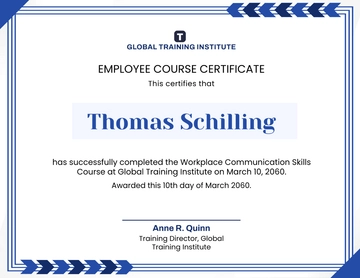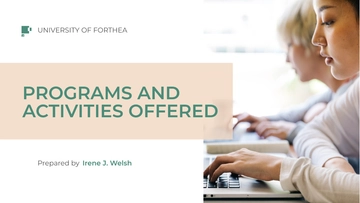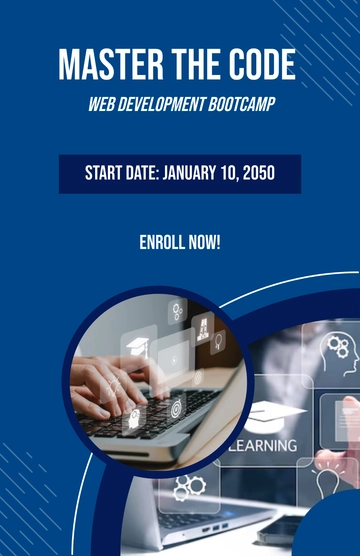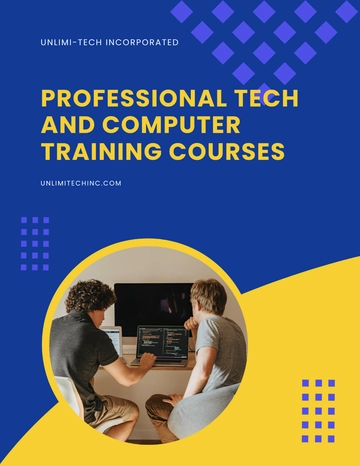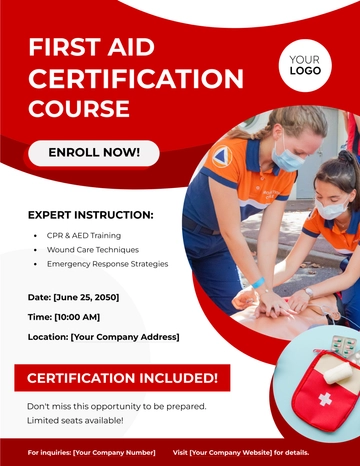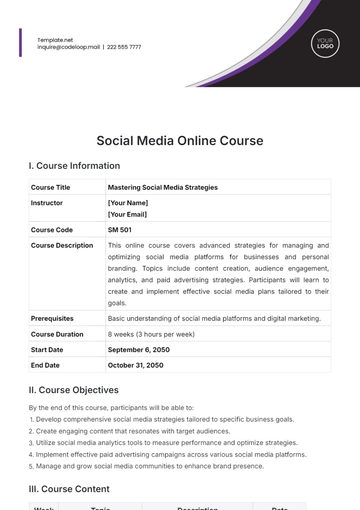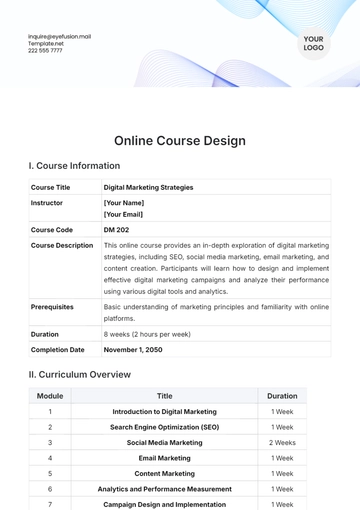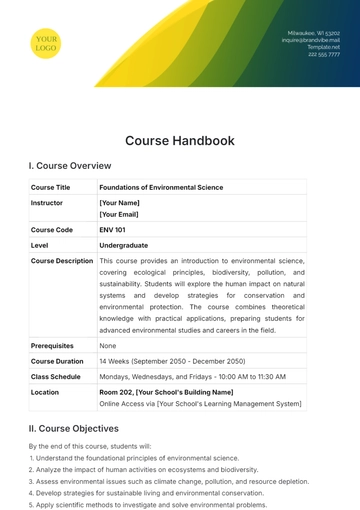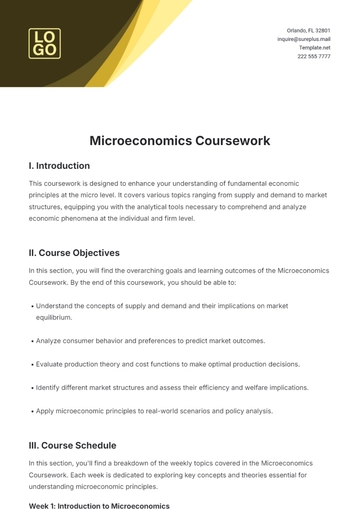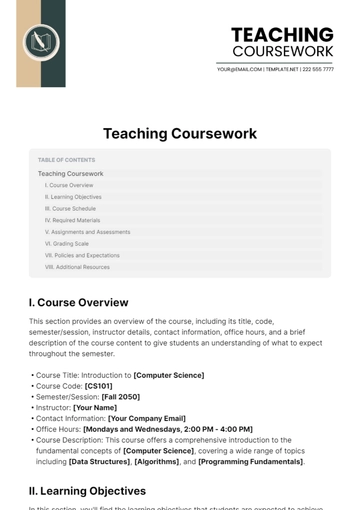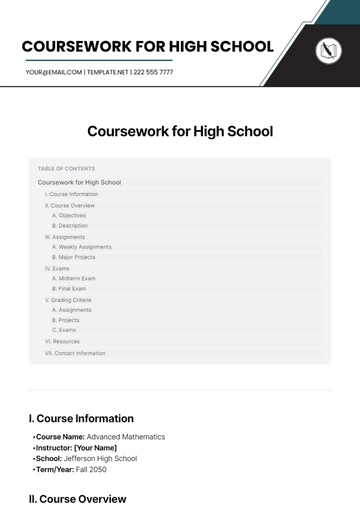Free School Courses
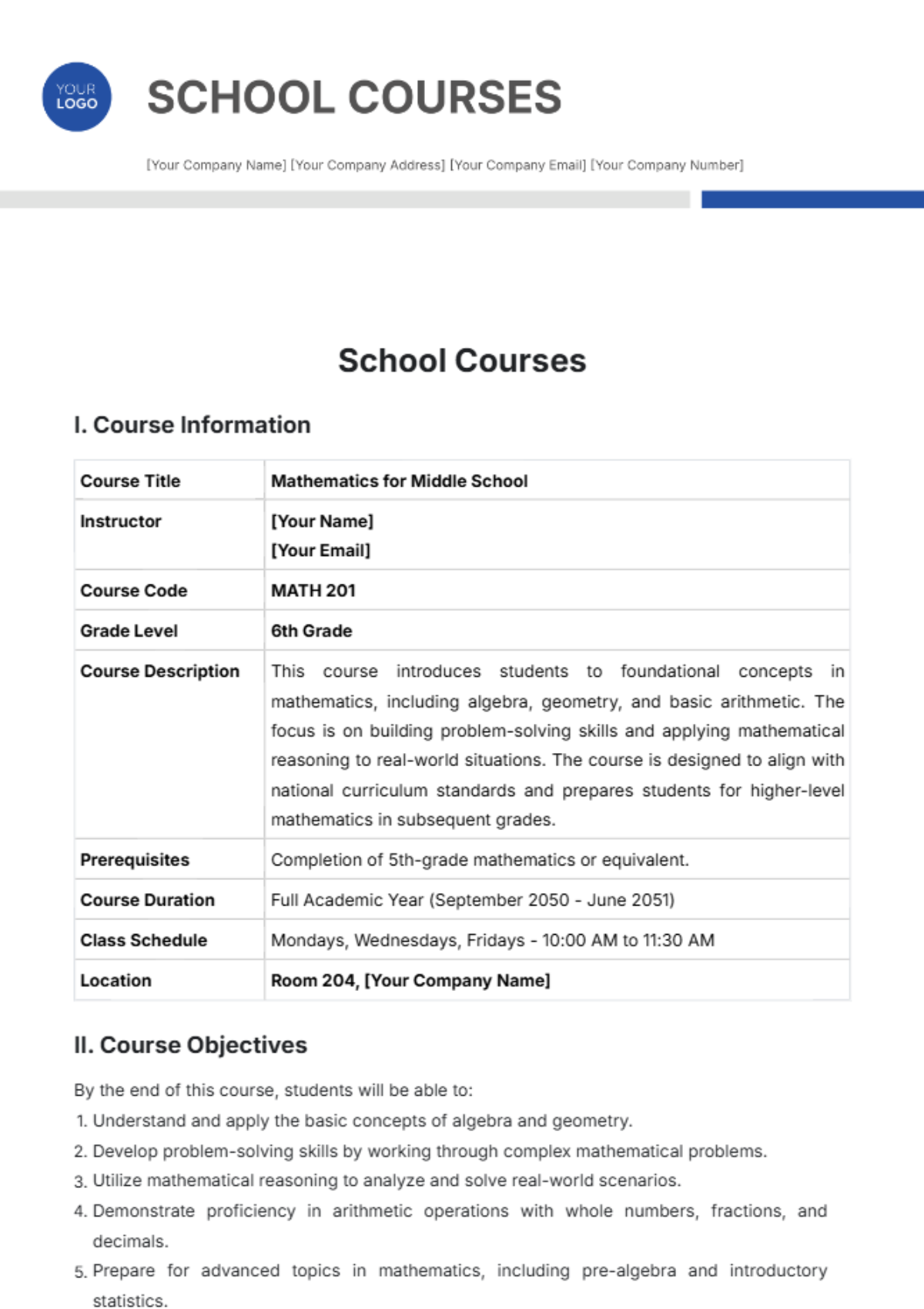
I. Course Information
Course Title | Mathematics for Middle School |
Instructor | [Your Name] |
Course Code | MATH 201 |
Grade Level | 6th Grade |
Course Description | This course introduces students to foundational concepts in mathematics, including algebra, geometry, and basic arithmetic. The focus is on building problem-solving skills and applying mathematical reasoning to real-world situations. The course is designed to align with national curriculum standards and prepares students for higher-level mathematics in subsequent grades. |
Prerequisites | Completion of 5th-grade mathematics or equivalent. |
Course Duration | Full Academic Year (September 2050 - June 2051) |
Class Schedule | Mondays, Wednesdays, Fridays - 10:00 AM to 11:30 AM |
Location | Room 204, [Your Company Name] |
II. Course Objectives
By the end of this course, students will be able to:
Understand and apply the basic concepts of algebra and geometry.
Develop problem-solving skills by working through complex mathematical problems.
Utilize mathematical reasoning to analyze and solve real-world scenarios.
Demonstrate proficiency in arithmetic operations with whole numbers, fractions, and decimals.
Prepare for advanced topics in mathematics, including pre-algebra and introductory statistics.
III. Course Content
Month | Unit | Description | Key Concepts |
|---|---|---|---|
September | Introduction to Mathematics | Overview of course content, expectations, and the importance of mathematics in daily life. | Arithmetic review, Problem-solving |
October | Basic Algebraic Concepts | Introduction to variables, expressions, and simple equations. | Variables, Expressions, Equations |
November | Fractions and Decimals | Understanding and working with fractions, decimals, and their applications. | Fraction operations, Decimal conversions |
December | Geometry: Shapes and Angles | Exploration of geometric shapes, angles, and basic properties. | Types of shapes, Angle measurement |
January | Measurement and Data | Measuring length, area, volume, and understanding data representation. | Units of measurement, Data graphs |
February | Ratio and Proportion | Introduction to ratios, proportions, and their applications in problem-solving. | Ratios, Proportions |
March | Advanced Geometry: Perimeter and Area | Calculating perimeter and area of various geometric figures. | Perimeter formulas, Area calculation |
April | Introduction to Statistics | Basics of statistical concepts including mean, median, mode, and range. | Descriptive statistics |
May | Algebra: Equations and Inequalities | Solving simple equations and inequalities, understanding their solutions. | Equation solving, Inequalities |
June | Course Review and Final Assessment | Comprehensive review of all topics covered and final assessment. | Review, Final Exam |
IV. Course Schedule
Week | Date | Topic/Activity | Assignments/Deadlines |
|---|---|---|---|
Week 1 | Sep 6-10, 2050 | Introduction & Course Overview | Assignment 1: Math Review Worksheet - Sep 10, 2050 |
Week 2 | Sep 13-17, 2050 | Introduction to Variables | Quiz 1: Basic Algebra - Sep 17, 2050 |
Week 3 | Sep 20-24, 2050 | Simplifying Expressions | Assignment 2: Algebra Practice - Sep 24, 2050 |
Week 4 | Sep 27-Oct 1, 2050 | Solving Simple Equations | Quiz 2: Equations - Oct 1, 2050 |
Week 5 | Oct 4-8, 2050 | Understanding Fractions | Assignment 3: Fraction Problems - Oct 8, 2050 |
Week 6 | Oct 11-15, 2050 | Converting Fractions to Decimals | Quiz 3: Fractions & Decimals - Oct 15, 2050 |
Week 7 | Oct 18-22, 2050 | Introduction to Geometry | Assignment 4: Geometry Worksheet - Oct 22, 2050 |
Week 8 | Oct 25-29, 2050 | Measuring Angles | Quiz 4: Geometry - Oct 29, 2050 |
Week 9 | Nov 1-5, 2050 | Understanding Area and Perimeter | Assignment 5: Perimeter Problems - Nov 5, 2050 |
Week 10 | Nov 8-12, 2050 | Data Representation | Project: Data Graph - Nov 12, 2050 |
Week 11 | Nov 15-19, 2050 | Introduction to Ratios | Quiz 5: Ratios - Nov 19, 2050 |
Week 12 | Nov 22-26, 2050 | Understanding Proportions | Assignment 6: Ratio Worksheet - Nov 26, 2050 |
Week 13 | Nov 29-Dec 3, 2050 | Descriptive Statistics | Quiz 6: Statistics - Dec 3, 2050 |
Week 14 | Dec 6-10, 2050 | Mid-Year Review and Assessment | Mid-Year Exam - Dec 10, 205 |
V. Assessment Methods
Assessment Type | Description | Weight |
|---|---|---|
Homework Assignments | Weekly assignments that reinforce the concepts covered in class. | 30% |
Quizzes | Regular quizzes to assess understanding of each topic. | 20% |
Projects | Hands-on projects that apply mathematical concepts to real-world scenarios. | 20% |
Mid-Year Exam | A comprehensive exam covering material from the first half of the course. | 10% |
Final Exam | A comprehensive exam covering all course material. | 20% |
VI. Required Materials
Material Type | Details |
|---|---|
Textbook | Mathematics for Middle Schoolers: A Comprehensive Guide by Jane Doe, Published by XYZ Education, 2050. |
Notebook | A dedicated mathematics notebook for class notes and homework. |
Calculator | Basic scientific calculator (non-programmable). |
Geometry Set | Includes compass, protractor, ruler, and set squares. |
Online Resources | Access to [Your Company Website] for additional practice and resources. |
VII. Course Policies
Policy | Details |
|---|---|
Attendance | Students are expected to attend all classes. More than three unexcused absences may result in a lower grade. |
Homework | Homework is due at the beginning of the next class. Late homework will receive a 10% deduction per day late. |
Class Participation | Active participation in class discussions and group activities is expected and will be factored into the final grade. |
Academic Integrity | Students must adhere to the school's academic honesty policy. Cheating or plagiarism will result in disciplinary action. |
Technology Use | Students must use school-provided tablets or laptops for accessing online resources during class. |
VIII. Parent/Guardian Involvement
Involvement Type | Details |
|---|---|
Progress Reports | Bi-weekly progress reports will be sent home to keep parents informed of student performance. |
Parent-Teacher Conferences | Scheduled twice a year, or as needed, to discuss student progress and address any concerns. |
Home Support | Parents are encouraged to support their child by reviewing homework, discussing class topics, and ensuring a quiet space for study. |
IX. Contact Information
A. Instructor:
[Your Name]
[Your Email]
B. School Information:
[Your Company Name]
[Your Company Email]
[Your Company Address]
X. Additional Notes
This course requires regular attendance and participation.
Supplementary materials and resources will be provided throughout the course.
Students should come prepared to each class with their materials and assignments.
- 100% Customizable, free editor
- Access 1 Million+ Templates, photo’s & graphics
- Download or share as a template
- Click and replace photos, graphics, text, backgrounds
- Resize, crop, AI write & more
- Access advanced editor
Discover the ultimate solution for structuring your educational curriculum with Template.net's School Courses Template. This fully customizable template offers a seamless experience, ensuring each course outline meets your unique needs. Effortlessly editable in our AI Editor Tool, streamline your course planning and enhance educational delivery today. Transform your curriculum with ease – get started now!

